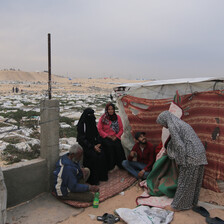The Electronic Intifada 20 May 2024

Children bear the brunt of Israel’s atrocities.
APA imagesIsrael is conducting a nonstop military offensive against Gaza, a densely populated strip of land. Advanced weaponry and cutting-edge technology are being used to attack unarmed civilians.
More than 35,000 people have been killed.
Families have been torn apart.
Homes have been destroyed.
Most of Gaza’s 2.3 million people have been displaced.
The scenes are beyond brutal. They defy comprehension.
Everyone has experienced chaos and the fear of imminent death.
People with life-threatening injuries are going through agony as the few remaining hospitals do not have the resources to provide them with adequate care.
The world has been turned upside down.
Children bear the brunt of the atrocities, which have marked effects on their physical and mental health.
The scars and nightmares caused by the current genocide will keep on haunting them.
The fact that so many people have been buried under the trouble or cannot be accounted for makes matters even worse.
Families are left in agonizing uncertainty. They do not know what happened to those who have been detained by Israel or buried in mass graves.
When surviving members of families are unable to find their loved ones, they cannot fulfill the need for what mental health professionals call closure.
Little room for grief
The dreadful experiences of people in Gaza leave little room for grief or mourning.
There is no space to facilitate understanding or to process trauma. The suffering is relentless.
The instinct to survive drives people to seek refuge in hospitals, schools or tents. They have to live in inhuman conditions and search for the little food and water still available.
So many people in Gaza are carrying the weight of their pain alone. They are unwilling to burden others with it.
They are experiencing a profound sense of isolation.
They feel abandoned by the world and unfairly blamed for their own suffering. Their perception of the world is now tainted with bitterness and disappointment, even hatred.
It will take time before the impact of the genocide on mental health can be properly analyzed.
As people are merely surviving, they are in a state of emotional numbness.
Many friends and relatives have said things like, “I hear the news of people dear to me dying as if it means nothing. I know I should cry but I don’t even feel sadness.”
“I feel like I’m observing myself from a distance. I don’t feel like myself anymore.”
“I am unable to experience happiness or sadness. I’m alive but I feel dead inside.”
Such emotional detachment serves as a coping mechanism. Yet it also signifies a major shift in individual personalities.
The shift will usually have long term consequences.
Dr. Mustafa Elmasri – a psychiatrist in Gaza – wrote on X (formerly Twitter) about how he was seeing “cases of nervous shutdown in young people.” They were “going mute” and “refusing to eat and staring in the void.”
Occasionally, they would speak a “few words of being locked inside in intense horror,” he added.
Dr. Mai Abdelaal used to be based at al-Nasr psychiatric hospital in northern Gaza. It has now been destroyed.Staff were unable to take anything from the hospital, apart from some medications.
The hospital’s previous patients are now with their families.
They are “scattered in schools, hospitals or camps,” Abdelaal said. “They pose a significant risk to themselves, their families and surrounding people, especially with the unavailability of medications.”
Empathy is therapy
Abdelaal is now working at a makeshift clinic in Deir al-Balah, central Gaza. Every day it has hundreds of patients seeking follow-up care, consultations or prescriptions.
Such clinics are ill-equipped and understaffed. They lack the space and resources necessary for proper patient care, particularly concerning antidepressants and antipsychotics.
Abdelaal noted that patients often arrive at the clinic agitated. Yet a remarkable transformation can occur.
With the help of active listening and compassion, patients gradually calm down and engage in dialogue with mutual respect and kindness.
“They just need to be heard,” Abdelaal said, underscoring the therapeutic value of empathy and understanding.
All of the clinic’s patients desperately need psychological support, with a significant portion requiring specialized intervention. However, trained psychiatric staff are scarce.
The current genocide is the latest episode in a cycle of death and suffering.
Forcing people to leave their homes is a deliberate policy. Among the tactics Israel has used to achieve that goal is flying quadcopters which emit the sound of children and women screaming.
By inflicting trauma, Israel is apparently seeking to change people’s mindsets and their core beliefs so that they will not attempt resistance in the future.
The trauma has been exacerbated and deepened by the false hopes raised by ceasefire negotiations. Those hopes have been replaced by despair every time Benjamin Netanyahu’s government has sabotaged a potential truce deal.
Dr. Samah Jabr, the Palestinian psychiatrist, made a pertinent observation earlier this year.
“PTSD [post-traumatic stress disorder] failed to capture the Palestinian experience of trauma fully,” she said. “A trauma that has no clear beginning or end. There is no P [post] in the Palestinian trauma.”
“Trauma in Palestine is colonial, continuous, collective, cumulative and cross-generational.It reverberates into every domain of Palestine life: health, identity, culture and economy.”
Despite enduring unspeakable atrocities, the people of Gaza remain steadfast in their pursuit of post-traumatic growth.Remarkably, individuals from various walks of life, including doctors, journalists and farmers, continue to selflessly serve their communities and amplify voices, often without any form of compensation.
Their unwavering dedication stands as a testament to the human spirit’s capacity to endure and thrive in the face of adversity.
Sewar Elejla was formerly a doctor at al-Shifa hospital in Gaza. She is now a Canada-based researcher.





